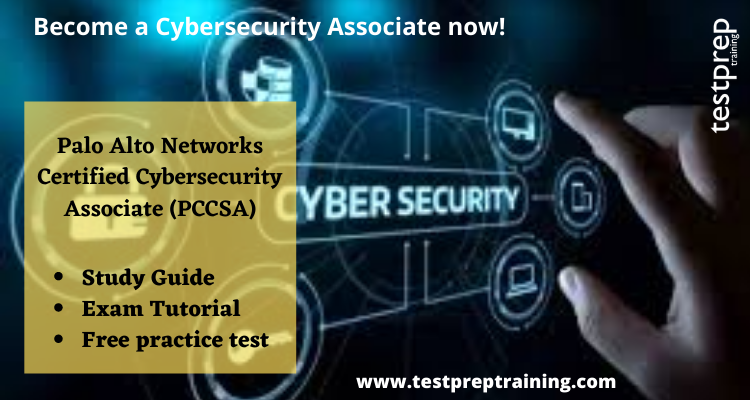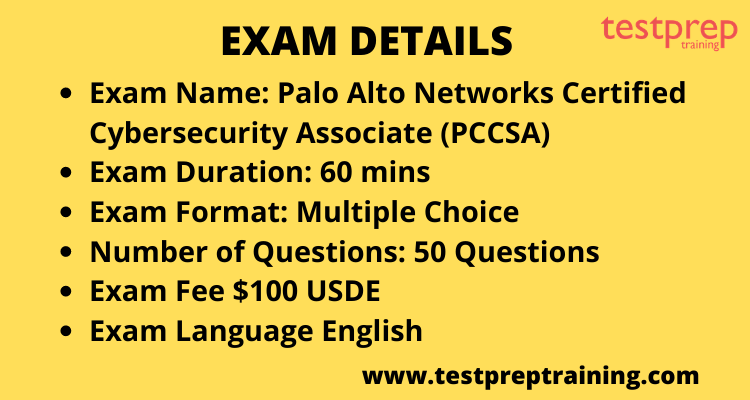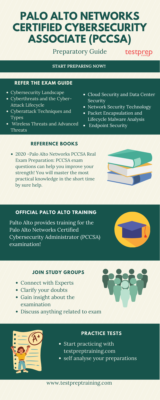Palo Alto Networks Certified Cybersecurity Associate (PCCSA)

The Palo Alto Networks Certified Cybersecurity Associate (PCCSA) study is for cybersecurity administrators who want to gain a thorough understanding of the newest trends in network-based cyberattacks and the cutting-edge technology that may be used to prevent them. To add to that, with the growing amount of cybercrimes every day, this certification will undoubtedly be a cherry on top of the cake for a cybersecurity associate.
Prerequisites for the exam:
It is suggested that the candidate must have basic understanding of networking and cybersecurity and up-to-date knowledge on cyber threats prior to attempting this certification exam.
Target Audience:
- Anyone who interfaces with cybersecurity, including sales executives, system engineers, security administrators, and students of cybersecurity.
Exam Details
- The Palo Alto Networks Certified Cybersecurity Associate (PCCSA) examination is a multiple-choice examination.
- The total number of questions in the examination is 50, however, the cost is $100 USD.
- To add on, the total time duration of the examination is 80 minutes.
- Also, you can give this examination in the English language only.

Exam Registration
For registering you are required to follow the steps below:
- Create an account on Pearson VUE. If you already have an account on Pearson VUE, then log in to the account.
- Search the examination name Palo Alto Networks Certified Cybersecurity Associate (PCCSA).
- Furthermore, select a location, and then register for a seat.
- At last, follow the prompts to register and make the payment.
Course Outline
Module 1 – Cybersecurity Foundation
- Cybersecurity Landscape
- Modern computing trends
- New application threat vectors
- Turbulence in the cloud
- SaaS application risks
- Compliance and security are not the same
- Recent high-profile cyberattack examples
- Cyberthreats
- Attacker profiles and motivations
- Modern cyberattack strategy
- Cyberattack Techniques and Types
- Malware
- Vulnerabilities and exploits
- Spamming and phishing
- Bots and botnets
- Wireless fidelity’s and Advanced Persistent Threats
- Wi-Fi vulnerabilities
- Wi-Fi attacks
- Advanced persistent threats
Module 2 – Cybersecurity Gateway
- The Connected Globe
- The NET: How things connect
- Introduction to networking devices
- Routed and routing protocols
- Area networks and topologies
- Domain Name System
- The internet of things
- Physical, Logical, and Virtual Addressing
- IP addressing basics
- Introduction to subnetting
- Packet Encapsulation and Lifecycle
- The OSI and TCP/IP models
- Data encapsulation
- Network Security Models
- Perimeter-based network security strategy
- Zero Trust security
- Network Security Technologies
- Firewalls
- Intrusion detection and intrusion prevention systems
- Web content filters
- Virtual private networks
- Unified threat management
- Secure Access Service Edge
- Security information and event management
- Security orchestration, automation, and response
- Endpoint security
- Endpoint security basics
- Malware protection
- Anti-spyware software
- Personal firewalls
- Host-based intrusion prevention systems
- Mobile device management
- Cloud, Virtualization, DevOps, and Storage Security
- Cloud computing
- Virtualization
- DevOps and cloud-native technologies
- Local and remote storage
- Data Center Security
- Traditional data security solution weaknesses
- East-west traffic protection
- Implementing security in virtual data centers
- Networking Concepts
- Server and system administration
- Directory services
- Structured host and network troubleshooting
- ITIL fundamentals
Module 3 – Cybersecurity Essentials
- Security Operating Platform
- Secure the Enterprise (Strata)
- Next-generation firewall
- Subscription services
- Network security management (Panorama)
- Secure the Cloud (Prisma)
- Cloud application security (Prisma Cloud)
- Secure Access Service Edge (Prisma Access)
- Prisma SaaS
- Secure the Future (Cortex)
- Endpoint protection (Cortex XDR)
- Cortex XSOAR
- Cortex Data Lake
- Threat intelligence (AutoFocus)
- IoT security (Zingbox)
Exam Policies
Every test contains a set of exam terms and conditions that the student must adhere to. PCCSA presents a number of test policies to help applicants comprehend the certification exam’s rules and processes. Here are a few examples:
- Exam Re-certification Policy
- The PCCSA certification is valid for 2 years from the date of passing the examination.
- The candidate showed to wait for six months after acquiring the certification before taking another PCCSA exam.
- Further, to keep your certification in Active status, you must recertify by taking PCCSA or PCNSE exam.
- Exam Score Report
- You will receive your examination score right after completing your examination.
- Simultaneously, you will get to know whether you passed or failed and receive a score report that shows your report and how well you performed in each section of the examination or knowledge domains.
- Cancellation Policy
- Consequently, to cancel exam candidates must contact Pearson VUE or access your online Pearson VUE account to cancel your exam up until the scheduled start time of your appointment.
- Failure to cancel before your scheduled appointment time or to show up for your scheduled appointment will result in the loss of your exam money.
For more information click on, Palo Alto Networks Certified Cybersecurity Associate (PCCSA) FAQ.
Preparatory Guide for Palo Alto Networks Certified Cybersecurity Associate (PCCSA)
It is important to acquire the appropriate study materials before beginning to prepare for any examination. As a result, there is a plethora of study material available on the internet. Following this study guide will assist you in learning and comprehending the objectives of each exam. We provide you with the greatest learning tools to help you pass the exam. Let’s get this party started:

1. Refer to the Exam Guide
Before every examination, it is recommended to check and refer to the official exam guide. Palo Alto provides an official exam guide and material to help you ace the preparation of the examination. it’s time to go through the basic exam details. Therefore, to ease out your preparation hunt we have provided a list of exam objectives you can refer:
- Cybersecurity Landscape
- Cyberthreats and the Cyber-Attack Lifecycle
- Cyberattack Techniques and Types
- Wireless Threats and Advanced Threats
- Cloud Security and Data Center Security
- Network Security Technology
- Packet Encapsulation and Lifecycle Malware Analysis
- Endpoint Security
2. Official Palto Alto Training
Palto Alto provides training for the Palo Alto Networks Certified Cybersecurity Administrator (PCCSA) examination. This official training will help you to learn all the domains and modules that are important for clearing the examination. It is advised to practice this training to successfully complete the examination.
3. Reference Books
Books are an important part of any preparation. To help you out and cut short your hunt for books. Below are few reference books which will help you in your preparation:
- 2020 -Palo Alto Networks PCCSA Real Exam Preparation: PCCSA exam questions can help you improve your strength! You will master the most practical knowledge in the short time by sure help
- 2020 -Palo Alto Networks PCCSA Real Exam Preparation: PCCSA exam questions can help you improve your strength! You will master the most practical knowledge in the short time by Pass IT
4. Join Study groups
Joining study groups is an excellent method to become totally immersed in the certification test for which you applied. These groups will assist you in keeping up to know with any recent modifications or exam updates. In addition, both novices and professionals are represented in these groups. You are free to ask any test-related question or discuss the exam without the fear of being judged. Furthermore, you may start a debate about any exam-related concern or query here. You will receive the best possible response to your inquiry if you do so.
5. Practice Tests
It is critical to put what you have learned into practice so that you can examine your results. By practicing, you will be able to enhance your answering abilities, which will save you a lot of time. Furthermore, the optimum time to begin practicing exams is after you have completed one whole topic since this will serve as a revision tool for you. Practice with free practice test papers now!


